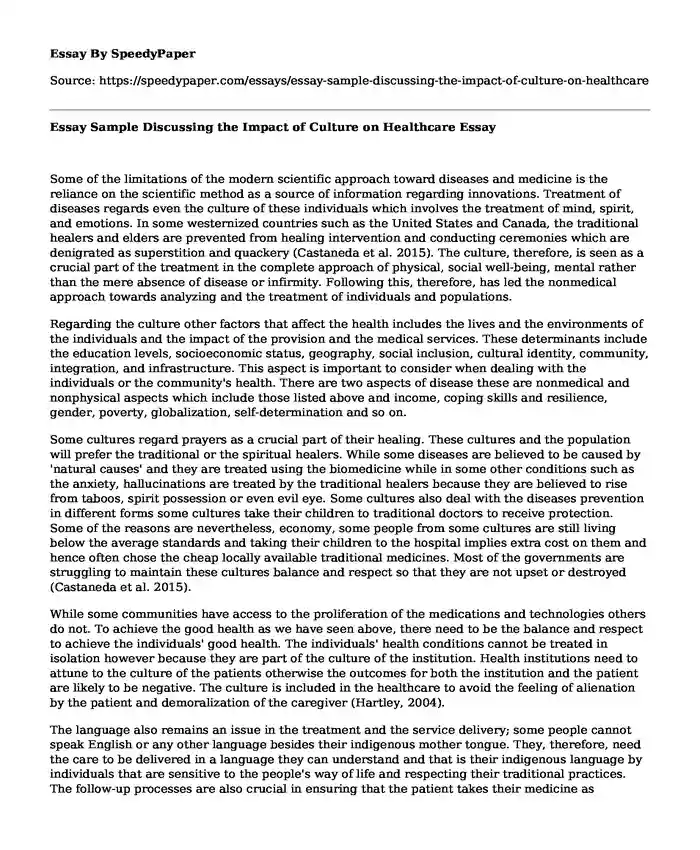
| Type of paper: | Case study |
| Categories: | Culture Healthcare |
| Pages: | 3 |
| Wordcount: | 714 words |
Some of the limitations of the modern scientific approach toward diseases and medicine is the reliance on the scientific method as a source of information regarding innovations. Treatment of diseases regards even the culture of these individuals which involves the treatment of mind, spirit, and emotions. In some westernized countries such as the United States and Canada, the traditional healers and elders are prevented from healing intervention and conducting ceremonies which are denigrated as superstition and quackery (Castaneda et al. 2015). The culture, therefore, is seen as a crucial part of the treatment in the complete approach of physical, social well-being, mental rather than the mere absence of disease or infirmity. Following this, therefore, has led the nonmedical approach towards analyzing and the treatment of individuals and populations.
Regarding the culture other factors that affect the health includes the lives and the environments of the individuals and the impact of the provision and the medical services. These determinants include the education levels, socioeconomic status, geography, social inclusion, cultural identity, community, integration, and infrastructure. This aspect is important to consider when dealing with the individuals or the community's health. There are two aspects of disease these are nonmedical and nonphysical aspects which include those listed above and income, coping skills and resilience, gender, poverty, globalization, self-determination and so on.
Some cultures regard prayers as a crucial part of their healing. These cultures and the population will prefer the traditional or the spiritual healers. While some diseases are believed to be caused by 'natural causes' and they are treated using the biomedicine while in some other conditions such as the anxiety, hallucinations are treated by the traditional healers because they are believed to rise from taboos, spirit possession or even evil eye. Some cultures also deal with the diseases prevention in different forms some cultures take their children to traditional doctors to receive protection. Some of the reasons are nevertheless, economy, some people from some cultures are still living below the average standards and taking their children to the hospital implies extra cost on them and hence often chose the cheap locally available traditional medicines. Most of the governments are struggling to maintain these cultures balance and respect so that they are not upset or destroyed (Castaneda et al. 2015).
While some communities have access to the proliferation of the medications and technologies others do not. To achieve the good health as we have seen above, there need to be the balance and respect to achieve the individuals' good health. The individuals' health conditions cannot be treated in isolation however because they are part of the culture of the institution. Health institutions need to attune to the culture of the patients otherwise the outcomes for both the institution and the patient are likely to be negative. The culture is included in the healthcare to avoid the feeling of alienation by the patient and demoralization of the caregiver (Hartley, 2004).
The language also remains an issue in the treatment and the service delivery; some people cannot speak English or any other language besides their indigenous mother tongue. They, therefore, need the care to be delivered in a language they can understand and that is their indigenous language by individuals that are sensitive to the people's way of life and respecting their traditional practices. The follow-up processes are also crucial in ensuring that the patient takes their medicine as prescribed. The medical practitioner must partner with other stakeholders in ensuring that the person who is, for instance, the elderly do not forget to take their medicine and on time. Different communities need the education regarding the designation of cultural conceptions of healing and health that is not found in the medical materialist or biomedical model of health. During the intervention, Treatment, and healing process the principle of respect remains a crucial part of the patient's recovery.
In the Muslim culture, for instance, a woman would not feel comfortable when they are being treated by a male nurse or doctor. A Muslim lady prefers to be handled by a fellow lady in all the treatment process because according to their culture this is how it should be. On the other hand, most Christian women will be free and feel secure when handled by the male doctors. In fact, some Christians female pa...
Cite this page
Essay Sample Discussing the Impact of Culture on Healthcare. (2022, May 04). Retrieved from https://speedypaper.com/essays/essay-sample-discussing-the-impact-of-culture-on-healthcare
Request Removal
If you are the original author of this essay and no longer wish to have it published on the SpeedyPaper website, please click below to request its removal:
- Law Essay Sample: Psychology and Law
- Maltese Language Essay Sample
- Why Is Racial Inequality a Problem? Find the Answer in This Free Essay
- Does the Community Play Any Role in Shaping Esperanza's Identity? Essay Sample
- The importance of documentation preservation
- Essay Example on Misinterpretation of Messages
- Wuthering Heights. Free Essay Example
Popular categories




